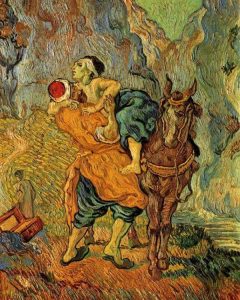
After many centuries of recounting Jesus’ Parable of the Good Samaritan (Luke 10:25-37) the story seems to have lost the “sting” Jesus intended for it. Especially now, when we are coming out of social isolation, perhaps it is appropriate to reflect on the Gospel story which reveals Jesus’ encounter with the legal scholar and his response to the question: Who is my neighbor? Perhaps now is a good time to reflect more deeply on Jesus’ teaching and its practical implications for our lives in these times of continued uncertainty.
In the Gospel story Jesus affirms the legal scholar: “You shall love the Lord, your God, with all your heart, with all your being, with all your strength, with all your mind, and your neighbor as yourself.” But the lawyer asks: “And who is my neighbor?” This is the question that prompts Jesus to offer a story revealing the vastness of God’s mercy, and of course, Jesus’ expectation of his followers.
It is significant that Jesus offers a Samaritan as the ideal model of God’s mercy. Jews despised Samaritans as a lower form of humanity. So, of course, it provoked his audience when Jesus told of the priest, then the Levite, walking thoughtlessly by the half-dead robbery victim lying at the side of the road. It is the third man, the Samaritan, who stops, renders the victim first aid and generously pays the innkeeper in advance for taking care of the brutally beaten victim.
Jesus’ parable teaches us that the neighbor is the person we encounter in our daily lives who is in dire need of our help. We are called to be good stewards of our fellow human beings, God’s precious children who we meet on our own journey in life. Our love and mercy are not confined to our families, friends, co-workers or fellow parishioners. The “sting” to the parable is that Jesus Christ expects us, his followers, to extend his love and mercy to others regardless of their race, religion, gender, culture, ethnicity or social standing.
Our Holy Father, Pope Francis, uses the Parable of the Good Samaritan to urge us not only to imitate the mercy of Jesus in our personal lives, but to have the courage and compassion to promote a culture of Christ’s mercy in our society as well.
To be a disciple of Jesus Christ obliges us to love and show mercy to those we don’t know nor recognize as “one of us.” The Samaritan in Jesus’ story did not see a stranger, alien or foreigner. He simply saw a suffering human being who needed help. Jesus asks: “So who was the neighbor to the robbers’ victim?” The legal scholar replied: “The one who treated him with mercy.” Jesus said to the scholar as he would say to us today: “Go and do likewise.”



